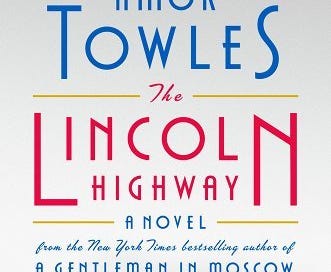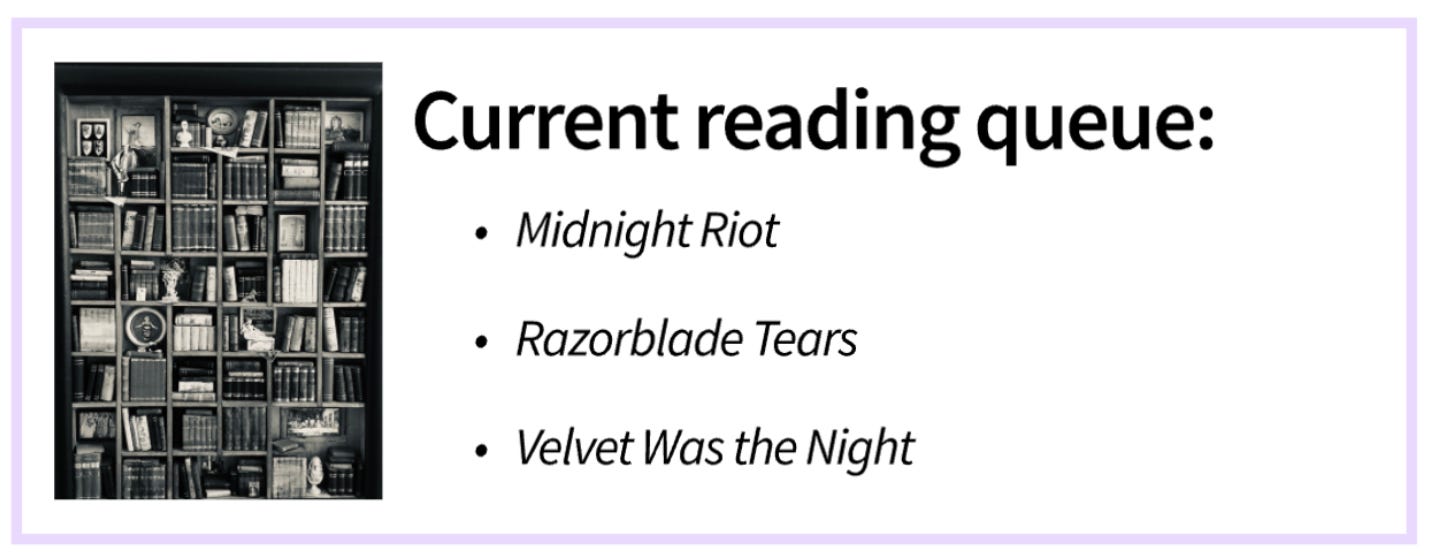If this newsletter weren’t already a Terry Gross Valentine (TERRY 2024), it might be mistaken for an Amor Towles appreciation page. I know he’s a polarizing author but I really adored his last two books, A Gentleman in Moscow and Rules of Civility, for their accessible literariness, their creativity, their wit and their style. So I was gleefully anticipating his latest novel, The Lincoln Highway.
Then when I learned it was a post-war road trip bildungsroman, I was … not immediately sold. Here’s your power summary:
Upon his father’s death, 18-year-old Emmett is released from a juvenile work farm in 1954 and driven home to Nebraska to find that his family farm has been sold. He’s determined to take his little brother, Billy, and start a new life in California, but plans take an unexpected turn when he discovers two of his friends from the work farm stowed away on the ride and have schemes of their own.
Sounds like it could be dreary and dusty, right? And because I’ll always tell you straight, the first few chapters were slightly slow-going, while ominously signaling toward the loss of innocence, harsh struggle, and-then-the-dog-dies kind of fiction that’s all the rage right now.
But very shortly in, this bloomed into an unexpectedly compelling quest. A little bit Huckleberry Finn, a little bit Thelma and Louise, a little bit The Odyssey … I enjoyed it and here’s why you might also:
#1. It’s a love letter to, and about, storytelling.
Every word in this novel is a paean to the importance of stories. From the multiple character perspectives, to Billy’s beloved and instrumental A-Z compilation of adventure tales, to the writers, theologians, actors, bullshit artists and campfire tale-tellers that populate this book - on every level, this is a book about stories. What we take from what we're told and what stories we craft for ourselves and others.
Not to mention, in true Amor Towles fashion, this book is stuffed to the gills with literary references, from Shakespeare to the Musketeers to the Greek epics to the medieval quests to the good-old fashioned road trips and quite a few that I’m certain I missed entirely. And while it’s deeply referenced (even if the writing isn’t quite as luxuriously eloquent as his past books), the reading experience is still quite buoyant. Which leads me to my next point!
#2. It’s propulsive and energetic.
Despite weighing in at a hefty 576 pages, this still manages to be a galloping read (yes, after a slow start). For those of you who disliked A Gentleman in Moscow because “nothing happens!” - well, get ready for an episodic series of adventures spanning multiple locations, dozens of characters, cities, and country roads.
Spanning ten days that count down with an increasing urgency, it’s a series of adventures, misadventures, knocks on doors and plot twists that keep you driving toward the conclusion that, I confess, surprised me until the actual last page.
#3. It’s a kaleidoscope setting of Americana.
I mean it’s a g-d 1950’s road trip novel and Amor Towles reminds you at every turn with diners and fairs, scam artists and vaudeville, farms and jams and Italian restaurants, Times Square, boxcars, down-at-the-heels bars and the shiny Empire State Building. So that was fun for me.
#4. It’s a good read with the audacity of hope.
Praise the Lord and hallelujah if this is the new fictional trend! One of the things I appreciated most was how this book mixed in wins with the losses, and hope with the hopelessness, with an almost old-fashioned sense that we need to believe in happy endings despite evidence to the contrary. It’s not a “light read” but there is lightness.
That’s propelled chiefly by the youth of most characters - Emmett and his friends are 18, poised on the precipice between youth and adulthood, trying to sort out their own paths and ethical codes. And Billy has the precocious trust and earnestness of an actual 8-year-old, anchoring everyone to their better angels. Youth can’t help but think that better things are around the corner and it keeps the overall book enjoyable even as shadows fell over the final chapters.
All these reasons I liked it are reasons I’ve heard for others who don’t like it - it is a little nostalgic, very episodic, with Towles-ian virtuosic writing in favor of generally more plainspoken characters. But this is a recommend for me (as long as you don’t miss his other two novels!)
Let me know what you thought in the comments:
This week’s newsletter made possible by my friend and reading comrade Spencer, who generously loaned me his copy when I was #77 on the library holds waitlist. Salute, Spencer!
The Fine Print
Every newsletter offers a different set of books (some old, some newer), so if you didn’t find anything you loved here, check the archive for past genres ranging from non-fiction to YA to mystery to fantasy to LGBTQ.
All links go to bookshop.org, which supports indie bookstores. You can view my entire catalog of recommendations here (any money made via these referral links will be donated to Defy Ventures, a good and noble organization.)
If you found a book you love here, or if you know a reading buddy who always asks you what to read, g’wan and share this newsletter, thanks!






